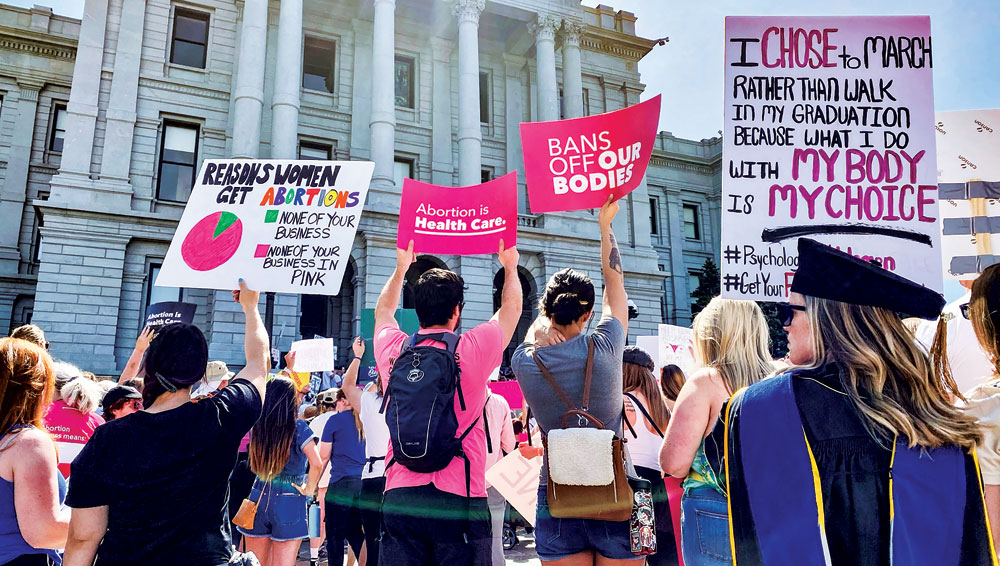
The Supreme Court opinion leak triggered thousands of almost exclusively pro-choice demonstrators at two May rallies at the Capitol in Denver. A Celebrate Life rally and march at the Capitol in January brought thousands to their event hosted by the Archdiocese of Denver and Respect Life Denver.
In early May, a mystery leaker sent shockwaves through the nation after releasing a draft of Justice Samuel Alito’s majority opinion to overturn Roe v. Wade, the landmark 1973 Supreme Court decision that ruled a woman’s right to abortion is protected by the constitution and therefore legal in all 50 states.
The current case poised to upset Roe is Dobbs v. Jackson Women’s Health Organization which aims to ban abortion after 15 weeks in the state of Mississippi except in the case of medical emergency or fetal abnormalities. Dobbs argues, in part, that the court should reject the point of viability—generally regarded as 24 weeks because that’s when a fetus can survive outside the womb—as a measuring tool. The Dobbs case includes citations of studies that show fetal pain begins as early as 12 weeks.

For the second consecutive Saturday in a row, rally-goers, including Sylvie Kelloff (9) from Aravda, marched at the Capitol to show their support for abortion rights. A handful of pro-life demonstrators were also present. The protest struck a mostly peaceful, impassioned tone.
The leaked opinion stirred up passions on both sides of the issue and left an agitated nation with more questions than answers. Here’s what we know for sure.
Abortion Isn’t Going Anywhere in Colorado
There is no gestational limit on abortion in Colorado and no bans restricting which abortion methods are utilized.
On April 4, Gov. Jared Polis codified Roe v. Wade by signing House Bill 1279 into law.
The bill declares that “every individual has a fundamental right to…have an abortion; and a fertilized egg, embryo or fetus does not have independent or derivative rights under the laws of the state.”
The bill prohibits state and local public entities from: “denying, restricting, interfering with or discriminating against an individual’s fundamental right to…have an abortion.”
Planned Parenthood Worries About Access, Overflow Care
Neta Meltzer, who’s with Planned Parenthood of the Rocky Mountains, said, “The draft we saw represents the worst-case scenario because it calls for overruling Roe and Casey.”

Speakers at the “Bans Off Our Bodies” rally on May 14 included Adrienne Mansanares, CEO and president of Planned Parenthood of the Rocky Mountains.
Planned Parenthood v. Casey was a 1992 Supreme Court decision that ruled restrictions on abortion are unconstitutional if they place an “undue burden” on a woman. “Undue burden” is defined as “a substantial obstacle in the pathway of a woman seeking abortion.” An example is requiring a woman to notify her husband prior to attaining an abortion.
“This has been a decades-long intentional chipping away of our rights with the ultimate goal of putting into place trigger laws, bans and restrictions that will ultimately result in half the states in the country with severe restrictions,” said Meltzer.
The biggest concern is access, not funding.
“We adjusted our business model years ago. We don’t rely heavily on state or government funding. We rely on community support. No matter what administration is in power or what the current sentiment is on [abortion], we would never have to shift what we’re able to offer,” said Meltzer. “We can be consistently available with services for our patients.”
If Roe is overturned and states surrounding Colorado further restrict access to abortion, Colorado may become an oasis in a multi-state abortion-desert. According to the Guttmacher institute, Arizona, Utah, Wyoming, Nebraska and Oklahoma are “certain or likely to ban abortion.”
Meltzer said they experienced a significant and discernible influx after Texas introduced the Heartbeat Bill, but they worry this will be unlike anything they’ve experienced before.
“From Sept. 21, 2021, which is when the bill went into effect until today, we’ve seen over 1,300 patients seeking abortion care. The total increase across our region is 438 percent. Those patients are leaving Texas to seek abortions in New Mexico, Colorado and Nevada.”
“The most important thing is for us to reach our patients and provide the kind of care they want,” said Meltzer. “We’ve invested in telehealth, and we have our PP Direct App. Some patients can access a [chemical] abortion through telehealth, and we might build more brick and mortars. All options are on the table.”
“Although the final decision might be complex and implications are unclear,” said Meltzer, “One thing’s for sure—we aren’t going anywhere.”
The Supreme Court is expected to rule at the end of June.
Front Porch photos by Christie Gosch


Keep sharing!
The SCOTUS decision today is sad news for gender equality in America. Once again, in my opinion, oldthink alpha males have asserted ownership of women’s wombs. Please be sure to vote this year!